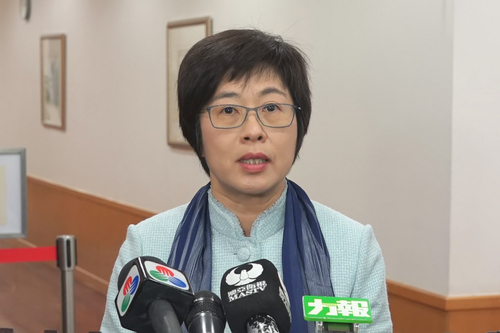 The Secretary for Administration and Justice, Ms Chan Hoi Fan, speaks to reporters.
The Secretary for Administration and Justice, Ms Chan Hoi Fan, speaks to reporters.
A Government-proposed revision of Macao’s Legislative Assembly Election Law has been amended to include a provision that candidates declare to uphold the Basic Law of Macao and pledge loyalty to the Macao Special Administrative Region (SAR). Such a proposed amendment was in line with a recent interpretation by the National People's Congress (NPC) regarding swearing allegiance to the country, the Secretary for Administration and Justice, Ms Chan Hoi Fan, said today (Monday). The proposed amendment was a step toward optimising the legal system for electing members of the Legislative Assembly and ought to be taken in order to prevent any misunderstandings in the future. The proposed amendment was initiated by the Government, rather than being a requirement from the Central Government, she added. Ms Chan made the comments this morning after a meeting of a Legislative Assembly committee tasked with analysing the Government-proposed revision to the Legislative Assembly Election Law. The bill was initially submitted to the Legislative Assembly in August; the latest amendment took place earlier this month. Candidates for Legislative Assembly Elections would be considered ineligible should they: refuse to uphold the Basic Law of Macao; refuse to pledge loyalty to the Macao SAR; or there were evidence against them demonstrating a refusal to uphold the Basic Law of Macao and/or show loyalty to the Macao SAR. How sincere candidates were when making the declarations anticipated under the proposed revision of the election law would be judged by the Electoral Affairs Commission for the Legislative Assembly Election, said Ms Chan. She added the proposal did not cover the concept of “legal memory”; whereby a candidate seeking election as a member of the Legislative Assembly might somehow be scrutinised to see if his or her previous public statements appeared to contradict the proposed revised requirements. The Electoral Affairs Commission for the Legislative Assembly Election might however take steps in order to confirm whether any candidates that had previously made statements appearing to question loyalty to the Basic Law of Macao or the Macao SAR had sincerely abandoned those questioning beliefs. If there were any objections to Commission decisions, candidates would have the opportunity to file an appeal to a Macao court, said the Secretary. The proposed revision to the Legislative Assembly Election Law also included optimisation of procedures to handle issues arising from any attempt by a Legislative Assembly member or Legislative Assembly candidate, to run for election as a public representative outside China. When the current law was formulated – and at the time of previous revisions –, the issue of dual allegiance had not arisen. The Government planned to remove from the proposed revised bill some provisions it had suggested in relation to permissible forms of electioneering. Some comments from legislators had suggested the proposed changes might be hard to enforce, said Ms Chan. After several rounds of discussion with members of the Legislative Assembly, the Government proposed to remove these provisions, but to leave in place those relating to the monitoring of election expenses. Regarding swearing allegiance to the country, the Standing Committee of the NPC issued earlier this month an interpretation of Article 104 of the Basic Law of Hong Kong, giving detailed requirements for swearing allegiance to the Hong Kong SAR and the country by candidates seeking a seat in the Legislative Council of Hong Kong. Article 101 of the Basic Law of Macao is basically the same as Article 104 of the Basic Law of Hong Kong, said Ms Chan. The NPC’s interpretation, issued on 7 November, at a time the Macao SAR Government had already embarked on revising the city’s Legislative Assembly Election Law, was an important reference point to implement successfully the Basic Law of Macao.


